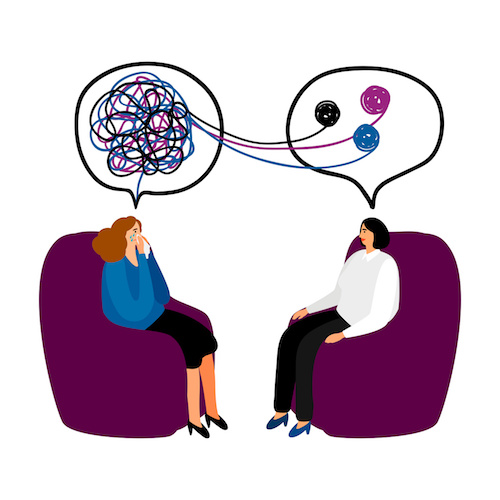Is Cognitive Behavioural Therapy the Right Choice for You? Find Out Here
Comprehensive Overview to Mental Health: Understanding Counseling, Therapy, and Available Resources
Mental wellness is a crucial aspect of overall wellness. Comprehending the numerous types of counseling and treatment can encourage individuals facing obstacles. Each treatment kind is made to meet details needs, supplying tailored support. Nonetheless, many stay unaware of the sources readily available to them. This overview aims to light up these choices, dealing with typical worries and barriers. It elevates a crucial inquiry: exactly how can one properly navigate the intricacies of psychological wellness assistance?
Understanding Mental Health And Wellness and Its Significance
Mental wellness functions as an important structure for overall wellness, influencing how individuals assume, feel, and engage with others. It encompasses psychological, emotional, and social elements, impacting daily functioning and quality of life. Excellent mental health advertises durability, making it possible for individuals to manage stress and navigate challenges properly. On the other hand, poor mental health and wellness can lead to a variety of problems, including anxiousness, depression, and difficulty in relationships.Understanding mental wellness is vital, as it aids to minimize preconception and urges open discussions about emotional struggles. Recognition of mental health likewise emphasizes the significance of self-care and seeking help when needed. Individuals who prioritize their psychological health are more likely to participate in healthy habits, maintain satisfying relationships, and add favorably to their communities. Recognizing the relevance of mental wellness fosters a holistic method to health, eventually improving the general lifestyle for individuals and culture all at once.

Sorts of Therapy and Therapy
Reliable psychological health treatment commonly includes different types of therapy and therapy customized to private requirements. One typical kind is specific therapy, where a therapist functions individually with a client to resolve specific problems. Group treatment, on the various other hand, enables people to share experiences and sustain one another in a structured atmosphere, frequently led by a facilitator. Family members treatment concentrates on boosting interaction and fixing conflicts within family characteristics, while pairs therapy addresses relationship challenges in between partners.Additionally, specialized therapy kinds, such as job counseling or despair therapy, target details life situations - Mental Health Resources. Cognitive-behavioral treatment (CBT) emphasizes the relationship between ideas, sensations, and behaviors, whereas holistic approaches may integrate numerous techniques, including mindfulness and art therapy. Each type serves distinct functions, using diverse paths for individuals looking for to enhance their psychological wellness and wellness
Typical Therapeutic Techniques
Various therapeutic approaches play a crucial role in mental wellness therapy. Cognitive Behavioral Therapy concentrates on changing adverse thought patterns, while Psychodynamic Treatment Techniques explore unconscious procedures. Humanistic approaches emphasize personal development and self-actualization, providing varied pathways for healing.
Cognitive Behavior Modification
Cognitive Behavior Modification (CBT) sticks out as a widely acknowledged strategy in the area of psychological wellness treatment, stressing the connection in between thoughts, sensations, and habits. This organized, ambitious treatment intends to identify and test adverse thought patterns, allowing people to establish much healthier coping systems. CBT is typically employed to address various psychological health concerns, consisting of stress and anxiety, anxiety, and obsessive-compulsive condition. Procedure usually involve the specialist and client functioning collaboratively to set details objectives and evaluate progression. Strategies made use of in CBT may consist of cognitive restructuring, direct exposure treatment, and skill-building workouts. With these approaches, individuals learn to modify their thought processes and habits, ultimately cultivating psychological resilience and improving overall psychological health.
Psychodynamic Therapy Techniques
Psychodynamic therapy methods concentrate on discovering the subconscious mind to understand how previous experiences shape existing behaviors and emotions. Secret methods include free organization, where clients share ideas without censorship, making it possible for the introduction of subconscious feelings. Dream analysis is another vital strategy, allowing therapists to interpret the symbolic significances of desires, revealing hidden problems. Transference plays a significant duty, as clients project sensations and attitudes from previous partnerships onto the specialist, giving understandings into relational patterns. Furthermore, specialists might use analysis, aiding clients acquire recognition of underlying concerns and conflicts. By cultivating a deeper understanding of internal processes, psychodynamic treatment intends to promote emotional healing and personal growth, ultimately improving customers' self-awareness and partnerships.

Humanistic Approaches Explained
Humanistic strategies to treatment highlight the inherent capacity for personal development and self-actualization within each individual. Rooted in the works of philosophers like Carl Rogers and Abraham Maslow, these techniques prioritize the subjective experiences of customers, promoting a setting of empathy and approval. Therapists frequently make use of strategies such as energetic listening and genuine positive regard, enabling clients to discover their ideas and feelings in a secure space. The objective is to help people recognize their toughness and develop a much deeper understanding of themselves, eventually bring about better emotional well-being. By concentrating on personal worths and self-discovery, humanistic therapy encourages clients to take responsibility for their selections and cultivate an even more authentic existence.
Locating the Right Mental Wellness Professional
Discovering the best mental wellness expert is important for efficient treatment. Individuals ought to know the various kinds of professionals available, such as psycho therapists, psychoanalysts, and licensed therapists. Examining their certifications and experience can help ensure an excellent suit for one's particular needs.
Kinds of Specialists
Guiding through the landscape of psychological wellness treatment can be overwhelming, particularly when it concerns picking the appropriate expert. Different kinds of psychological health and wellness professionals exist, each specializing in different elements of care. Psychiatrists are clinical physicians that can prescribe drug and address facility psychological health conditions. Psychologists focus on therapy and evaluation, giving therapy and screening solutions. Certified therapists and social employees typically supply support via talk therapy, aiding customers navigate life obstacles. Marital relationship and family specialists focus on relational problems, aiming to enhance communication and dynamics within family members. Lastly, psychiatric nurses supply care and support, commonly functioning together with psychoanalysts to keep track of medication and treatment web link plans. Recognizing these duties can aid people in making educated selections for their psychological health and wellness demands.
Evaluating Credentials and Experience
When looking for the right mental wellness expert, examining their qualifications and experience is crucial for ensuring effective treatment. Potential clients ought to confirm that the professional holds appropriate levels, licenses, and certifications in their area of proficiency. Furthermore, recognizing the therapist's expertise-- such as professional psychology, social job, or counseling-- can assist align their skills with the client's specific requirements. Experience matters, as professionals with a solid record in treating certain conditions might supply a lot more effective methods - Marriage Counselling. Customers may likewise consider the therapist's method and techniques by reading testimonies or reviews. Eventually, an extensive analysis of certifications and experience can considerably influence the therapeutic connection and the general success of mental health therapy
Community Resources for Mental Health Support
Numerous community sources are available to sustain individuals seeking psychological health and wellness assistance. Regional psychological wellness organizations frequently supply services such as therapy, support system, and educational programs aimed at promoting psychological health. Lots of areas also provide helplines, which link people with experienced professionals that can give instant support and guidance.Nonprofit companies often facilitate workshops and neighborhood occasions to increase awareness concerning psychological health and wellness problems and decrease stigma. Universities and colleges might have therapy services available for students, guaranteeing that youths have accessibility to required support.Additionally, locations of praise commonly develop risk-free spaces for people to review their mental health struggles and discover convenience within their communities. By using these sources, people can navigate their mental health obstacles better and find a feeling of belonging and comprehending in their neighborhood environments.
Overcoming Barriers to Looking For Aid
When it comes to looking for assistance for psychological wellness issues, lots of people face substantial barriers. Stigma typically impends large, deterring individuals from getting to out due to fear of judgment or misunderstanding. Furthermore, a lack of awareness about readily available resources can complicate the decision-making procedure, leaving prospective clients feeling isolated. Financial constraints likewise play an important role; many individuals can not pay for therapy or counseling services, which can worsen their struggles. Cultural distinctions may affect understandings of mental health and wellness, making it testing for some to look for aid. Geographical restrictions contribute too, particularly in country areas where psychological wellness professionals might be scarce. Conquering these barriers calls for a multifaceted strategy, including education to reduce preconception, boosted accessibility to resources, and boosted community support. By resolving these obstacles, individuals might really feel extra empowered to go after the assistance they require for their mental well-being.

The Role of Self-Care in Mental Health Care
Self-care symbolizes an important component of psychological wellness maintenance, acting as a proactive strategy for people to improve their psychological health. Involving in self-care activities can markedly decrease anxiety, improve mood, and foster durability against life's obstacles. This diverse approach includes physical, psychological, and social aspects, permitting people to customize their practices to meet individual needs.Regular exercise, a well balanced diet regimen, and enough sleep are fundamental elements that sustain mental health. Furthermore, mindfulness techniques, such as reflection or journaling, can promote self-awareness and psychological guideline. Social links better improve self-care, offering important support and decreasing sensations of seclusion.
Often Asked Inquiries
Exactly how Do I Know if I Need Therapy?
Figuring out go to this site the need for therapy includes acknowledging consistent feelings of anxiety, tension, or unhappiness, problem coping with life, or experiencing significant changes in habits. Consulting a psychological health expert can give clarity and assistance.

What Should I Anticipate Throughout My First Counseling Session?
During the initial therapy session, helpful resources people can expect an initial evaluation, conversation of problems, and establishment of goals. Therapists often create a safe environment, motivating open interaction while describing the restorative procedure and privacy.
How Much Time Does Treatment Typically Last?
Therapy duration differs commonly, usually depending on individual needs and treatment goals. Usually, sessions can last from a couple of weeks to a number of months or even years, with frequency and length customized per individual's scenarios.
Are Online Treatment Procedure as Effective as In-Person?
Research indicates that online therapy sessions can be as effective as in-person ones, depending on specific choices and the healing partnership. Many customers report comparable advantages, including comfort and access, resulting in effective results.
Can I Change Therapists if I'm Not Comfortable?
If they really feel uneasy, individuals can change therapists. It is crucial for the restorative connection to foster count on and convenience, and finding a much better fit can greatly boost the effectiveness of the therapy procedure. Conversely, inadequate mental wellness can lead to a variety of problems, consisting of anxiety, depression, and trouble in relationships.Understanding psychological wellness is important, as it aids to minimize preconception and motivates open conversations concerning emotional struggles. Reliable mental health treatment typically includes numerous forms of therapy and therapy tailored to specific needs. Neighborhood mental wellness organizations often supply solutions such as counseling, support teams, and academic programs aimed at promoting psychological wellness. Many areas also supply helplines, which connect people with skilled specialists that can offer instant support and guidance.Nonprofit companies frequently promote workshops and community occasions to raise understanding about mental health problems and decrease stigma. Colleges and universities might have counseling services readily available for trainees, guaranteeing that young people have access to necessary support.Additionally, locations of praise commonly develop risk-free spaces for people to discuss their mental health and wellness struggles and locate convenience within their areas.